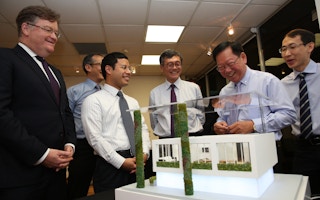Imagine this: You’re heading home after a long day’s work in a densely-populated city in Southeast Asia. After wrestling with peak hour traffic for an hour, you finally reach your apartment, which is located above a bustling expressway chockablock with frustrated drivers desperate to get home.
But just as you enter your front door, something remarkable happens. The frenzied noise from your surroundings is instantly muted and you are greeted instead by the calming sound of a light drizzle on rustling leaves. After more than 12 hours of tuning into the pulse of the city, you are finally at peace.
This indoor soundscape system is one of the many innovations that the public can hope to enjoy in the coming years, thanks to a S$2.25 million gift to the National University of Singapore from Singapore-listed property developer City Developments Limited (CDL).
The contribution will help bring to fruition two new research initiatives – the NUS-CDL Smart Green Home and NUS-CDL Tropical Technologies Laboratory (T² Lab) – aimed at developing sustainable solutions for urban living in tropical climates.
Initiated by CDL’s late deputy chairman Kwek Leng Joo, these projects are part of CDL’s effort to champion cutting-edge technologies and innovation in sustainable living.
At the launch of the research laboratories last month, CDL chief executive officer Grant Kelley said that the initiative was “in support of the national vision for a smarter, greener and more liveable Singapore”.
“CDL is excited to collaborate with NUS on the NUS-CDL Smart Green Home and T2 Lab, with EDB as our supporting partner. These programmes will unlock many possibilities to create innovative products and solutions for our future homes, from interiors to façade and building materials integral to a sustainable, climate-resilient cityscape,” he shared.
Smart and green
The NUS-CDL Smart Green Home will be designed as a 100-square-metre full-sized home for testing, evaluating and piloting smart household innovations.
It will provide a “plug-and-play” real-life environment and house research projects dedicated to enhancing comfort and quality of life. These include materials that amplify indoor sounds for seniors and adaptive climate control design such as heat-conductive beddings and anti-solar nano-coated windows.
The NUS-CDL T² Lab will look beyond the indoor environment. It will provide a customisable indoor-outdoor research space to study new ideas in the integration of passive and active building systems, as well as the adaptability of the Singapore home to ageing, safety and security, work-life balance, and social and cultural expectations.
It will be used to test lifestyle scenarios and technologies, while identifying ways to mitigate the environmental impact caused by external tropical elements and weather conditions.
One research project that will take place at the T² Lab is an experimental study on integrating building façade design, construction and operation suited to Singapore’s climatic conditions. This includes the study of incorporating sun-shading shutters with solar membranes and panels on rooftops or vertical wall surfaces.
The lab will also aim to adopt an integrated engineering system – including a Low Voltage Direct Current system that will complement the photovoltaic panels installed on the lab’s protective surface – to reduce electrical usage.
“
More than half of its population now lives in towns and cities, and by 2030, this number is projected to swell to some 5 billion. At the same time, our climate is rapidly changing and resources are depleting. So Singapore’s focus on making our city-state smarter, greener and more liveable is indeed the way to go.
Grant Kelley, chief executive officer, CDL
Both research initiatives will be located on university grounds at Kent Ridge, in the west of Singapore. The NUS-CDL Smart Green Home – which will be completed by December 2017 – will be located within a new building at the NUS School of Design and Environment and managed by the School’s Department of Building, while the T² Lab will be built by the end of this year on an existing structure on the NUS Kent Ridge Campus.
Desmond Lee, Senior Minister of State, Ministry of Home Affairs and Ministry of National Development said at the launch held at the School of Design and Environment that the laboratories are “an important addition to Singapore’s research and development ecosystem”, which will help put a liveable, smart and green Singapore within reach.
The announcement of NUS-CDL Smart Green Home and T² Lab comes at a time when the country’s Economic Development Board (EDB) has identified urban solutions and sustainability as an area of focus that will receive dedicated public research funding in the next five years.
CDL’s Kelley noted that the world “is undergoing the largest wave of urban growth in history”.
“More than half of its population now lives in towns and cities, and by 2030, this number is projected to swell to some 5 billion. At the same time, our climate is rapidly changing and resources are depleting. So Singapore’s focus on making our city-state smarter, greener and more liveable is indeed the way to go,” he said.
Professor Heng Chye Kiang, dean of NUS School of Design and Environment, noted that the growth of smart and green living technologies has also been accompanied by rising academic interest. The university has witnessed growing class sizes for sustainability-related programmes in the past five years.
“There is an increased awareness of students on the importance of global climate change, carbon emissions and sustainable buildings and cities. There is [also] an increased demand for both local and international [working] professionals [to be] trained with knowledge and skills in sustainability at different levels,” Prof Heng told Eco-Business.
“While still considered an extra qualification at this juncture, professionals and urban planners will eventually be expected to acquire these knowledge and skills as part of their basic skills set,” he added.
Goh Chee Kiong, executive director of cities, infrastructure and industrial solutions at EDB, said this research partnership is a prime example of how companies can work with government partners and institutes of higher learning to capture business opportunities in urban planning and sustainable development.
“With CDL’s expertise in pioneering sustainable building innovations, we look forward to sharing our industry knowledge and carrying out pilot testing at our future developments.
“The capabilities developed by the two NUS-CDL platforms will also set new benchmarks for our building industry, as Singapore gears up to become a smart and sustainable nation,” Kelley added.


















